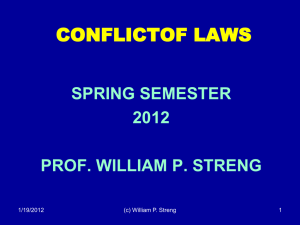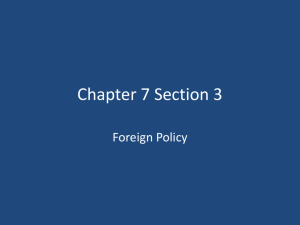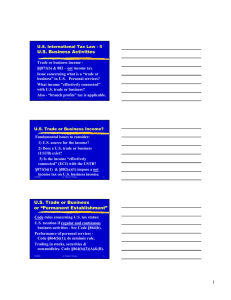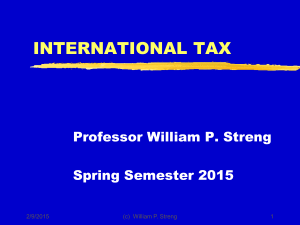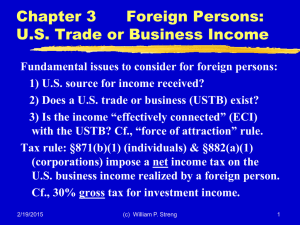U.S. International Tax Law
advertisement
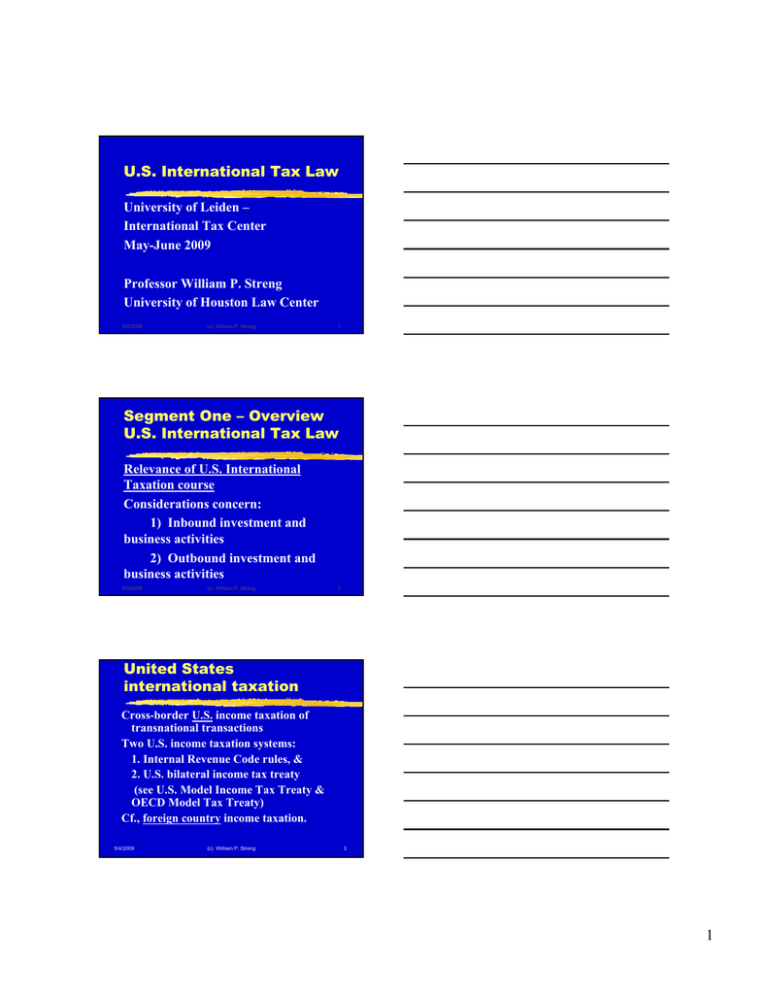
U.S. International Tax Law University of Leiden – International Tax Center May-June 2009 Professor William P. Streng University of Houston Law Center 5/4/2009 (c) William P. Streng 1 Segment One – Overview U.S. International Tax Law Relevance of U.S. International Taxation course Considerations concern: 1) Inbound investment and business activities 2) Outbound investment and business activities 5/4/2009 (c) William P. Streng 2 United States international taxation Cross-border U.S. income taxation of transnational transactions Two U.S. income taxation systems: 1. Internal Revenue Code rules, & 2. U.S. bilateral income tax treaty (see U.S. Model Income Tax Treaty & OECD Model Tax Treaty) Cf., foreign country income taxation. 5/4/2009 (c) William P. Streng 3 1 The process of going outbound: 5/4/2009 1) Export of goods 2) Licensing of intangibles 3) Investment in non-movable assets in destination jurisdiction (c) William P. Streng 4 Process of coming into the United States Immigration – changing individual or entity U.S. tax status Passive Investment securities (stocks & bonds) real estate Active trade or business 5/4/2009 (c) William P. Streng 5 IRC §61 - Income “from whatever source derived” Tax base theory: Cost analysis - cost to government Benefit analysis - what benefits received? Ability to pay? 5/4/2009 (c) William P. Streng 6 2 Other jurisdictional approaches: 1. Political allegiance (i.e., passport) 2. Residence 3. Domicile or permanent residence 4. Physical location of the owner’s wealth 5/4/2009 (c) William P. Streng 7 Considering the reach of cross border taxation Impact of "customary international law” International tax collection & enforcement problems – no cross-border tax enforcement therefore, collection at source on passive, investment income. 5/4/2009 (c) William P. Streng 8 International Tax Neutrality Concepts Capital export neutrality - same tax rate regardless of the location of taxpayer (but possible higher foreign tax cost). Capital import neutrality - all firms in the same market are subject to the same rate of tax. 5/4/2009 (c) William P. Streng 9 3 Limiting international economic double taxation 1) territorial/exemption system current proposals 2) foreign tax credit system - the source country has priority to tax. or, deduction - foreign tax paid. 3) allocation of the income tax liability - e.g., lower withholding rates at source – bilateral response. 5/4/2009 (c) William P. Streng 10 Deferral Principle of U.S. Outbound Taxation 1) Taxation of branch income - §61 2) Foreign subsidiary - respecting the foreign legal entity personality. But, possible U.S. income tax applicability of “Subpart F” (of Subchapter N) limiting tax deferral. Consider transfer pricing opportunities 5/4/2009 (c) William P. Streng 11 Potential “Double NonTaxation” Cross border tax “arbitrage” – What is “arbitrage”? Objective: avoidance of taxation in both jurisdictions because of differing residence or sourcing rules. Achieved through (1) income characterization rules & (2) use of hybrid entities. 5/4/2009 (c) William P. Streng 12 4 The Role of International Bilateral Tax Treaties §894(a)(1) - “due regard” for treaties. Purposes of bilateral income tax treaties: 1) define “residence” status. 2) tax rate reductions – avoiding double taxation (allocate income to residence?) 3) cooperation between taxing authorities and enable the exchange of tax information. 5/4/2009 (c) William P. Streng 13 Other Relevant International Agreements 1) Tax Information Exchange Agreements 2) FCN Treaties – Friendship, Commerce and Navigation Treaties 3) Memoranda of Understanding (MOUs) on specific issues: Note IRS Announcements 2006-4, 2006-5 & 2006-6 (Japan, Canada and Mexico). 4) Mutual Legal Assistance Treaty – criminal matters. 5/4/2009 (c) William P. Streng 14 Tax Treaty Ratification Process 1) Negotiation by U.S. Treasury Department representatives. 2) “Advice & consent” by U.S. Senate, after review by Foreign Relations Committee (not the Senate Finance Committee) 3) No U.S. House of Representatives participation in the tax treaty process. 4) Effective upon an exchange of instruments of ratification. 5/4/2009 (c) William P. Streng 15 5 Treatment of Income Items under Income Tax Treaties Business income - tax if “permanent establishment”; cf., sales income but no P.E. in a foreign jurisdiction. Personal services income -183 day rule & income not from U.S. fixed base. Nonbusiness income - reduction of the rate of tax withholding at source. Capital gains - tax immunity at source. Other income - tax at residence. 5/4/2009 (c) William P. Streng 16 Certain Treatment under Income Tax Treaties Taxes covered – “income taxes” - not state taxes. Cf., California “unitary taxation.” Resident status defined – “tiebreaker” rules are applicable. “Savings clause” for U.S. taxpayers. Tax expatriation provision is included. 5/4/2009 (c) William P. Streng 17 Treaty Shopping - Inbound Situation & “LOB” 1) Third Foreign Country Corp owns 100% of 2) Netherlands Corporation (“participation exemption”) owns 100 % of 3) U. S. Corp. (&U.S. investment) Cf., U.S. outbound investment situation & treaty shopping. (next slide) 5/4/2009 (c) William P. Streng 18 6 Responses to “Treaty Shopping” Limit “treaty shopping”? How? 1) “Form vs. substance” – Aiken Industries case. 2) Statutory anti-treaty shopping rules – e.g., Code §884(e). 3) Anti-conduit rules-Code §7701(l). 4) “Limitation of benefits” provisions in income tax treaties. 5/4/2009 (c) William P. Streng 19 Treaty Nondiscrimination Provision Model Treaty, Article 24. 1) Provides for taxation of nationals of the other country no more burdensome than taxation of locals - assuming the same circumstances. 2) Applicability of tax treaty provisions to states in the U.S. (but not other tax treaty provisions). 5/4/2009 (c) William P. Streng 20 Tax Treaty Administrative Cooperation Provision 1. Information provided to the other country: a) Routine exchanges b) Spontaneous exchanges c) Specific requests 2. Mutual agreement procedures 3. Privacy concerns – see §6103(k)(4) re IRS sharing information with treaty partner 5/4/2009 (c) William P. Streng 21 7 Relationship between the Tax Treaty and the Code Code §7852(d)(1) – provides that neither tax treaty nor a Code provision has preferential status. “Later in time” rule of priority – Code or the applicable treaty. “Treaty override” issue – can/should Congress override a tax treaty? 5/4/2009 (c) William P. Streng 22 8

